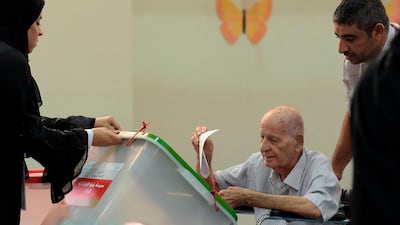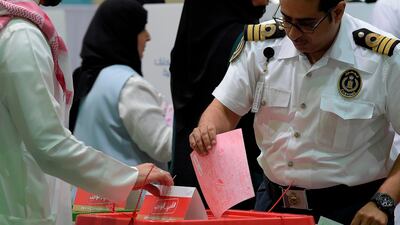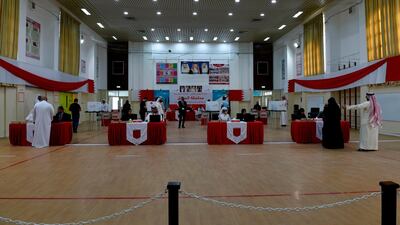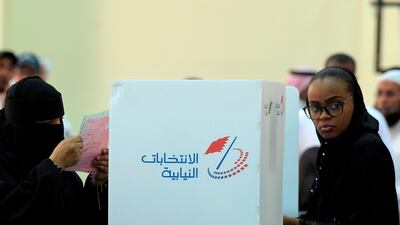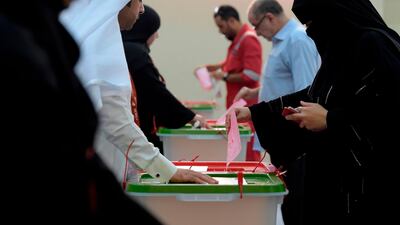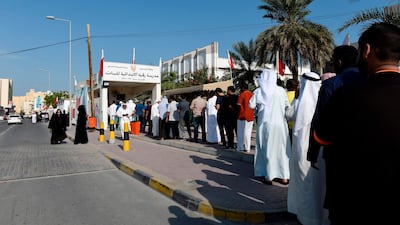Turnout for Bahrain's parliamentary and municipal elections was about 67 per cent, Justice Minister Sheikh Khalid bin Ali Al Khalifa said after the polling stations closed at 8pm.
About 360,000 Bahrainis were eligible to cast ballots for the 293 candidates – including 41 women – running for a spot in the 40-seat parliament as well as around 200 others for local council seats.
"These elections have registered the highest number of parliamentary candidates since the return of parliamentary life in 2002, while 50,000 young men and women have participated in the elections for the first time," Sheikh Khalid, who also heads the Supreme Elections Committee, said earlier.
The government had anticipated a higher turnout than the 2014 election, in which 53 per cent of eligible voters cast their ballots.
Only 23 of the 40 incumbent MP are seeking re-election, indicating that whatever the result the makeup of the legislature will be different. The vote comes at a crucial time for the island nation that is seeking to attract foreign investment and improve a stalling economy. Earlier this year, Bahrain received a multi-million-dollar cash injection from Saudi Arabia to help bolster public finances. However, they have also discovered the country’s large oil and gas field and are looking for foreign partners to begin exploitation.
However, rights groups and activists have criticised the process after two main opposition groups were barred from fielding candidates.
In May last year, the Shiite majority Al Wefaq and the secular Waad movements were barred from the race.
The government denies barring political discussion, saying that there are 16 political societies in the country and the majority have registered candidates for this year’s vote.
_______________
Read more:
Bahrain Elections: a push for political legitimacy
Bahrain to hold elections on November 24
Bahrain receives pledge of support from GCC peers to help its economy
_______________
Al Wefaq withdrew its 18 parliamentarians from the National Assembly during the country’s 2011 protests. They have called for a boycott of these elections citing political marginalisation.
The group has taken often taken an extreme approach to politics in Bahrain, drawing its religious legitimacy from the interpretations of the Ulama Council, a group of Shiite Islamic clerics in Bahrain.
To avoid questions of political legitimacy, the government has tried to convince Shiites to turn out despite the boycott. It has encouraged candidates to run as independents, to draw out the Shiite voter. During the 2014 elections, which saw a similar boycott, the government figures showed just over 50 per cent of eligible voters turning out.
“These elections, therefore, are a test to see how willing the majority Shiite population is to participate despite the opposition boycott and the steps taken by the government against such groups in recent years,” said Miriam Goldman Eps, head of intelligence at Le Beck, a consultancy group based in Bahrain.
The kingdom's interior ministry had called on Bahrainis to disregard rumours and seek "trusted sources" for information. "Text messages saying your name has been removed and calling on you not to vote are false," the ministry said in a Twitter post.
The ministry later accused Iran of sending the messages, saying it was "the source of 40,000 e-messages to disturb the parliamentary and municipal elections".
At least six people were detained and charged this month for "obstructing the electoral process", according to Bahrain's public prosecutor.
Since the protests in 2011, which were in large part led by the Shiite majority, Bahrain’s government has maintained that opposition groups in the country are funded by external actors, mainly Iran but more recently Qatar.
Under the 2002 constitution, 40 citizens will be elected to the Council of Representatives. They will be joined by 40 royal appointees to Bahrain's upper house, called the Consultative Council.
The upper chamber has the power to block legislation by the lower house.
The lower house has the authority to examine and pass legislation proposed by the king or cabinet and also has monitoring powers.
